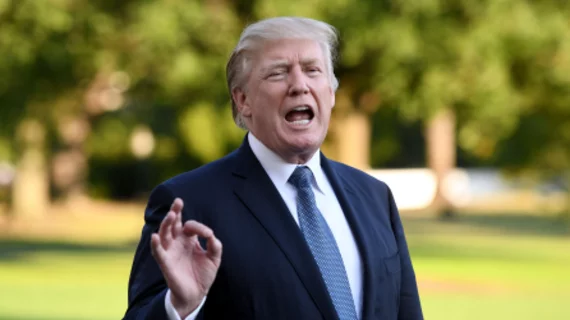Trump calls on DOJ to sue opioid makers in a federal case
Days after the state of New York filed suit against the manufacturer of a powerful opioid, President Donald Trump stated he’d like to see a federal lawsuit against more opioid makers. Trump made the statement during a Cabinet meeting Thursday and asked Attorney General Jeff Sessions to bring forth a “major lawsuit against the drug companies.”
“Some states have done it, but I’d like a lawsuit to be brought against these companies that are really sending opioids at a level that it shouldn’t be happening,” Trump said. “It’s so highly addictive. People go into a hospital with a broken arm. They come out, they’re a drug addict.”
Federal action
Earlier this week, New York sued Purdue Pharma, a drug manufacturer known for producing OxyContin, over allegations the company misled prescribers and patients about the risks of opioids and overstated the benefits.
“Rather than just joining them, I’d like to bring a federal lawsuit against those companies,” Trump said, though he did not articulate any specific companies.
The opioid misuse and abuse epidemic reached new heights in 2017, resulting in more than 72,000 U.S. deaths, according to the latest figures from the Centers for Disease Control and Prevention (CDC). In addition, people have been so desperate to get their hands on highly-addictive painkillers that the FDA issued a statement this week outlining a new resource guide for veterinarians after reports of pet owners injuring their pets in order to receive prescriptions came to light.
Several major drug makers are facing hundreds of lawsuits from states, cities, and individuals over opioid marketing, manufacturing and lobbying practices.
The Department of Justice (DOJ) is working with states and exploring other legal options, according to Sessions.
“We’ve joined with the states, and we are looking at various different legal avenues to go after abusive companies,” he said during the meeting.
Trump further asked Sessions to look into ways to reduce the influx of synthetic opioids from China, including fentanyl–a potent narcotic that has a high risk for addiction and dependence, has been likened to heroin, and, when used illegally or abused, has been linked to hundreds of overdoses in the U.S.
Trump called the flow of fentanyl into the U.S. from China “almost a form of warfare.”
“We’re returning indictments now against distributors from China,” Sessions said. “We’ve identified certain companies that are moving drugs from China, fentanyl in particular.”
DEA actions
Also on Thursday, the DOJ and the U.S. Drug Enforcement Administration (DEA) proposed a reduction for controlled substance manufacturing in the nation next year, including reducing quotas for the six most frequently misused opioids by an average of 10 percent from 2018 levels.
Trump previously set a goal of reducing opioid prescription rates by one-third over three years. The aggregate quota, when set, is allocated among individual manufacturers by the DEA to those that apply for the procurement quotas. The quota system was established under the Controlled Substance Act.
“This significant drop in prescriptions by doctors and DEA’s production quota adjustment will continue to reduce the amount of drugs available for illicit diversion and abuse while ensuring that patients will continue to have access to proper medicine,” DEA Acting Administrator Uttam Dhillon said in a statement about the proposal.
The proposal follows a new rule published in July that allows the agencies to consider drugs with high risks for abuse and addiction when settings production limits. Previously, only sales and demand could be considered in quotas.

